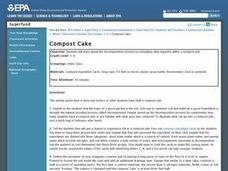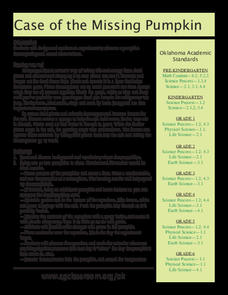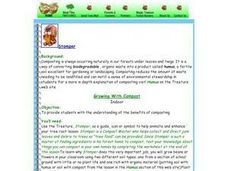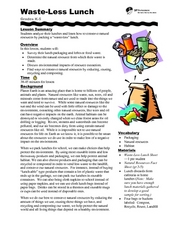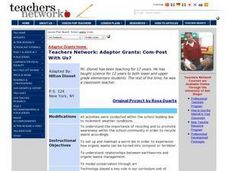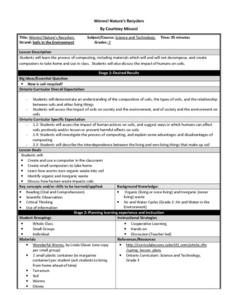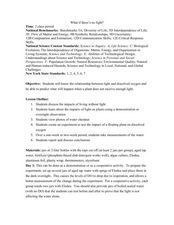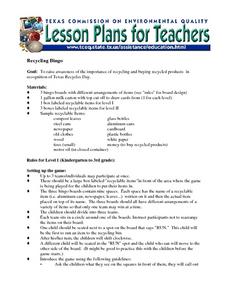Science Matters
Crawly Composters
Get your hands dirty with an interactive instructional activity that showcases the process of decomposing and returning nutrients back into the soil. After building a compost pile, pupils regularly observe the...
Curated OER
Compost Cake
Students examine the decomposition process. They create their own class compost pile and record their observations. They discover which materials decompose at a different rate.
California Academy of Science
Composting: A Scientific Investigation: California Academy of Sciences
Garbage, recycle, compost: Does it really matter where we put our trash once we are done? By making detailed observations over seven weeks, kids will see which materials break down naturally to become a healthy part of the soil, and...
Curated OER
Composting
In this recognizing items that can be composted worksheet, students identify organic items that can be composted, write items that can be composted for each of the letters in the word compost, and make a list of vegetables and fruits....
Curated OER
Case of the Missing Pumpkin
Scientists define and discuss decomposition, and watch pumpkins decompose and return to soil in classroom experiment. They record the date the experiment began, chart changes in pumpkins on a calendar, count how many days it takes...
Cal Recycle
Conserving Natural Resources
Trying to plan an engaging elementary science unit on natural resources? Conserve your energy! This five-part series of lessons and hands-on activities has exactly what you need to teach young scholars about the importance of conservation.
Curated OER
Life In the Soil: Home Sweet Home: Red Worms
In this soil worksheet, learners complete 2 pages about the importance of soil in plant growth. Students read about red worms and answer 2 questions about composting. Learners fill out a chart with their observations of plants planted in...
Curated OER
Growing With Compost
Students discuss the positives and negatives of composting. They plant their own plant using composting material and record results. They create a poster for the classroom.
Curated OER
Organic and Inorganic Waste
Students conduct a scientific investigation about organic or inorganic waste. In this organic or inorganic waste lesson, students create a compost heap to determine the difference between inorganic and organic waste. Students record...
SF Environment
Waste-Less Lunch
Is it possible to have a waste-less lunch? Can your class become leaders in conservation? Discuss the importance of reducing waste during lunch time with a fun lesson that can be extended to everyday practices. First the class examines...
Curated OER
Com-Post With Us?
Students discuss the importance of reducing, recycling and reusing materials to help the environment. As a class, they create a worm bin and observe how it turns material in to compost. They use the internet to research the...
Curated OER
Com-Post With Us? Learn About Recycling While Having Fun
Learners examine the importance of recycling to help the environment. In groups, they make a compost bin on the school grounds recording how the material changes from week to week. They collect other materials for recycling like cell...
Curated OER
3RC (Reduce, Reuse, Recycle and Compost)
Students examine the effects of packaging decisions and the engineering advancements in packaging materials and waste management. They observe biodegradation in a model landfill.
California Academy of Science
Where Do I Put My Trash?
Where does the trash go after you put it in the garbage can? The class discusses sustainability, recycling, compost, and landfills as they play as fun relay game. In teams, they race to be the fastest group to successfully sort their...
Curated OER
Worms, Nature's Recyclers!
Students study what worms need to survive in different environments. They study how worm composting improves soil and reduce waste. They discuss composting techniques and present a puppet show about a worm's life.
Curated OER
What If There's No Light?
students discuss the importance of light and the consequences of living without it. Using a plant as a demonstration, students predict and observe what happens to a plant when it does not receive enough light. In groups, they experiment...
Curated OER
How Long Until Dirt
Third graders examine the difference between composting and wasting food. They problem-solve what to do about leftovers after lunches so good food doesn't go to waste.They study food storage techniques that are environmentally friendly...
Curated OER
The Effects of Trash and Garbage On the Environment
Students recognize the importance of solid waste management. In this science lesson plan, students analyze individual solid waste management habits as they enhance their knowledge of solid waste disposal and the recycling process.
Curated OER
Recycling & Our Environment
Students present information about recycling to other students. In this environmental protection lesson, students create a puppet show or commercial about the importance of recycling for other students to view.
Curated OER
Recycling Bingo
Students participate in Texas Recycles Day. They discover the importance of recycling and how it helps the environment. They discover which products are recyclable and which ones are not.
Curated OER
Are You Balanced With Your Environment?
Students discuss the impact of not keeping the environment in balance for future generations. As a class, they are introduced to the concept of "Balance of Nature" and what it means. In groups, they research the role of trees and how to...
Curated OER
Dinnertime for Animals
Is a deer an herbivore? What about a spider? Experiment with the food chain in an interactive science experiment. After listing the herbivores from a selection of animals, third and fourth graders compare the skulls and teeth of...
Curated OER
Growing Vegetable Soup
Students use children's literature in order to think about the concept of creating a garden. This is done through conducting simple research about types of plants that could be grown in the area and how to care for them. Then the garden...
Curated OER
Sensational Seaweed
Learners compare kelp and land plants. In this sea plant lesson, students look at the role of algae in aquatic environments. They research the properties of kelp and explore seaweed.



